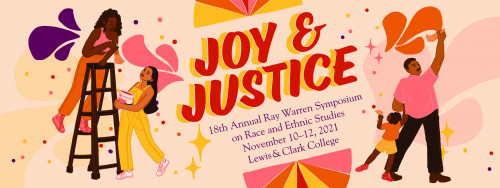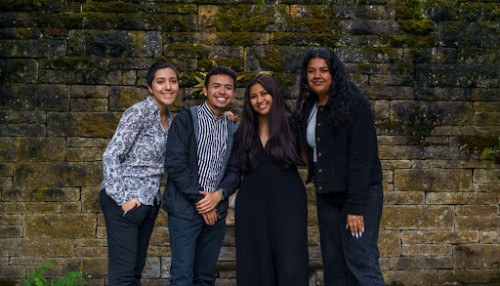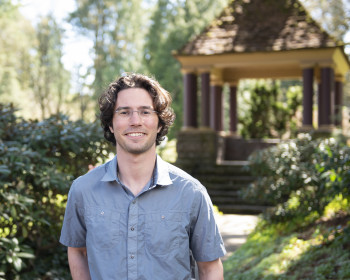Annual Ray Warren Symposium Explores Joy and Justice
by Franchesca Schrambling BA ’22
The 18th annual Ray Warren Symposium on Race and Ethnic Studies will explore and traverse the interconnections of Joy & Justice. Through the lenses of race, ethnicity, and identity, participants will take a leap of faith to contemplate liberation through joy. In asking what sparks joy for individuals and for communities, as well as how it is expressed, this year’s symposium hopes to encourage reflection and inspire the creation of new spaces for love, strength, and perseverance.

Organized by a team of passionate undergraduate student cochairs—Fabi Araya Rodríguez BA ’23, Anmol Kahlon BA ’22, Diana Pacheco BA ’22, and Mateo Telles BA ’22—the three-day event is designed to affirm that “joy is resistance; joy is power; joy is healing.”
“For me, this year’s theme of Joy & Justice has to do with the ability of Black, Indigenous, and people of color (BIPOC) to succeed and thrive outside of the stereotypes of suffering and sacrifice,” said Araya Rodríguez, a Hispanic studies major with a double minor in ethnic studies and music. “We need to prioritize the needs for happiness, safety, and justice of marginalized communities.”
In-person events, scheduled from November 10 through November 12, include a showcase of student research, discussion panels, and keynote speakers who work in the arts. Wednesday’s keynote speaker Matika Wilbur, a professional photographer, works to interrupt conventional narratives of Native communities and bring important stories into focus. Thursday’s keynote speaker Ashon Crawley, a professor and scholar of religion, music, and performance—in addition to being a visual and sonic artist—uses his work to bring attention to love, mysticism, imagination, and hope.
Attendees will be encouraged to cultivate joy through a dance workshop led by DJ Anjali and an art therapy open studio, facilitated by Art for Social Change. They can also visit a student-curated art show and virtual gallery, thanks to the efforts of participating artists and curators Jeremiah Guerrero BA ’22 and Natalie Kirunda BA ’24. The symposium will conclude with the powerful Race Monologues, in which students write and share original pieces of personal narratives involving feelings, experiences, and understandings of race, ethnicity, and identity.
In conjunction with the symposium, Watzek Library will host the exhibit Joy, Community, and Resilience in Vietnamese Portland, which features photographs, writings, and quotes from a diverse range of the city’s Vietnamese people. The exhibit, curated by Ben Warner BA ’22 and Mei Bailey BA ’22, will be on display on the top floor of the library through the end of fall semester.
“In many ways, our symposium theme emerged from the exhaustion, fatigue, and pain of the past several years. It extends last year’s focus on movement and our 2019 examination of revolutionary struggle,” explained Kimberly Brodkin, associate professor with term of humanities and director of both the Ray Warren Symposium and the Gender Studies Symposium. “What’s distinctive is the emphasis on joy as a key dimension of that struggle and of that movement. The idea isn’t to minimize the experience of hardship, struggle, pain, and trauma, but it is important not to make those the defining narrative of BIPOC lives.”
Pacheco, a sociology and anthropology major and a Middle East and North African studies minor adds: “Joy & Justice is important to me because I believe that the world often does not make space for us, speaking as a BIPOC, to be joyful. This theme makes space for us to be joyful as a form of resistance.”
More Newsroom Stories
Public Relations is located in McAfee on the Undergraduate Campus.
MSC: 19
email public@lclark.edu
voice 503-768-7970
Public Relations
Lewis & Clark
615 S. Palatine Hill Road MSC 19
Portland OR 97219


